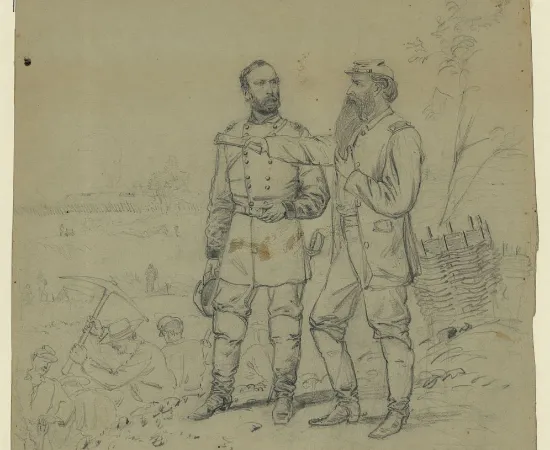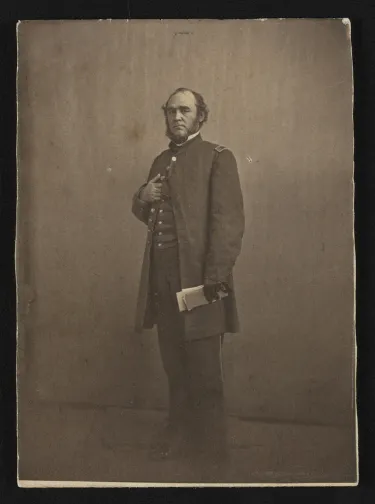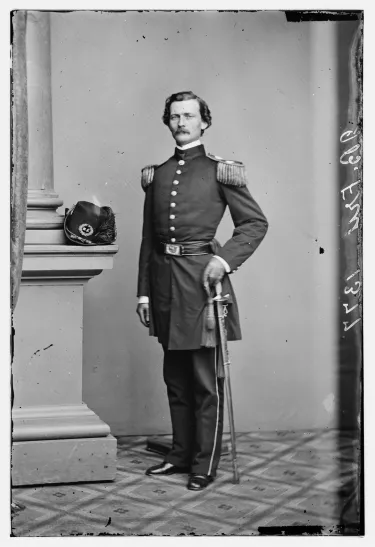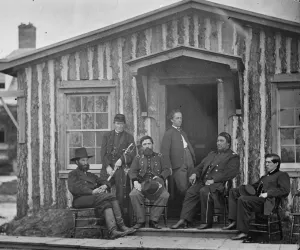
Civil War staff officers were vital to the operations of Civil War armies. Their efforts ensured that the armies were not only prepared for battle, but also had all necessary supplies to travel and camp throughout the war. Staff officers, from the halls of Washington and Richmond to the battlefield and the company mess, were employed at every level of the rival armed forces.

Staff officers accompanied leaders at every level of the Civil War. Just as there was overall northern Quartermaster General Montgomery Meigs, who directed the flow of supplies for the whole Union Army, individual divisions, brigades, and regiments would also have their own quartermasters, each responsible for distributing those supplies throughout their own level in the chain of command. Whether a Civil War leader was in command of a regiment, a division, a whole army, or even several armies, he was always surrounded by staff officers who filled the roles described below.
Weapons and Ammunition

Chief of Ordnance: The Ordnance Department, officially developed in 1812, was responsible for managing the army's supply of weapons--cannons, muskets, swords, pistols, ammunition, and more. Prior to the outbreak of war, the duties of the Ordance Department were managed by the Secretary of War. With the expansion of the army, it became too cumbersome of a task to manage the armies’ supply of weapons - hence the Ordnance Department was created. Due to scarcity of weapons in the early days of the war, many were commissioned from Europe.
Chief of Artillery: The role of the Chief of Artillery was to organize and train artillerymen. This included moving both the artillerymen and cannons to specific strategic positions on the field of battle. Henry Jackson Hunt was the Chief of Artillery for the Army of the Potomac. Hunt distinguished himself early in the war when his four-gun battery covered the Union retreat after Bull Run. From there, he was named Chief of Artillery for the Army of the Potomac and would be best recognized for his efforts during the Battle of Gettysburg.
Food and Medicine

Quartermaster General: The Quartermaster General oversaw the overall supply of the armies. This included providing soldiers with adequate food, clothing, and other supplies needed to sustain the soldiers on campaign and in camp. Prior to the outbreak of the Civil War, General Joseph Johnston served as Quartermaster for the United States Army, but he quickly resigned from his position to support the Confederacy. To fill this vacancy, President Lincoln appointed General Montgomery C. Meigs. With the massive expansion of both the Union and Confederate armies, it was necessary for each regiment to have a quartermaster general, lieutenant, and sergeant master to ensure the proper supply of the troops.
Chief of Commissary: The Commissary Department was responsible for supplying foodstuffs to all soldiers. "An army marches on its stomach," once opined Napoleon. Just as important as the supply of weapons was the constant supply of food to keep the armies nourished to the best of the Commissary Department’s ability. Each soldier was allocated a certain supply of food per meal, per day – known as a ration.
Medical Director: The Medical Director served as the coordinator for all medical staff. This included surgeons, field hospital staff, nurses, etc. All entities worked toward the same mission of saving as many lives as possible in the most efficient and sanitary way. Jonathan Letterman completely changed the methods in which wounded men were cared for both on and off the battlefield, establishing principles which still guide 911 and triage systems.

Organization and Discipline

Provost Marshal: The Provost (pronounced "pro-vo" in the Army and "pro-vost" in academia) Marshal General was established in March of 1863 under the Enrollment Act. James Barnet Fry was appointed to the Union position and was tasked, in association with Secretary of War, Edwin Stanton, to oversee the drafting of troops. This included the enforcement of the draft and therefore arresting deserters. Fry then also had to cope with riots in relation to the unpopular draft law. To accomplish the task of enlisting volunteers, while also maintaining statistics on how many troops were wounded or killed in action, Fry relied on Acting Assistant Provost Marshals General from each state or territory to relay information. Veteran or disabled soldiers frequently served as a "provost guard" that would enforce discipline in the armies. The office of Provost Marshal General was abolished in August of 1866 and would not be fully reestablished until World War I.
Judge Advocate General: The position of Judge Advocate General was officially created by President Abraham Lincoln in July of 1862. Judge Advocate Generals, today referred to as JAGs, prepared charges and served on general courts in cases regarding military jurisdiction. Given the nature of the position, it was necessary for the individuals in these positions to have had legal experience or education as a foundation. During the Civil War, judge advocates, and military lawyers in general, served on both the Lincoln Assassination trials and the trial of the commandant of Andersonville Prison - Captain Henry Wirz.
Inspector General: The role of the Inspector General was defined to include the following duties: organize and discipline the army; visit and inspect the camps, prisons, hospitals, and places of arms; designate men and horses unfit for war; and examine the books of quartermasters, paymasters, and companies to ascertain the balances. It was also a key position of the inspector general to inventory and manage all supplies. As such, it was imperative for the inspector general to communicate with other members of the staff to coordinate the delivery and maintenance of all necessary materials.

Military Secretary: Military Secretaries assisted generals in administrative tasks. Ely Parker served as military secretary to General Grant and was the only Native American to be promoted to the rank of General in the Union Army during the war. He was present at Appomattox when Lee surrendered and assisted in the drafting of the terms of surrender.
Aide-de-Camp: Officers were entitled to a confidential assistant, known as an aide-de-camp. The aide's duties included writing and delivering orders. This was a position of responsibility since he knew troop positions and where officer quarters were located. Aides-de-camp were officers by virtue of this position and only took orders from their commanders.
Movement and Communication
Chief of Engineers: The Chief of Engineers led troops in the planning and erecting of defenses, construction and deconstruction of roads and bridges, placing and removing obstructions, conducting topographical surveys during campaigns, and preparing, then distributing accurate maps. Brig. Gens. Joseph G. Totten and Richard Delafield led regular infantry men, volunteers, and hired civilians to achieve these aims. The Confederacy also established a Corps of Engineers, led by five different generals throughout the war. The Confederate Army established the Corps of Engineers based on the knowledge of many former U.S. Army engineers. While these men brought a vast amount of knowledge and developed skillset, the Confederacy lacked the same caliber of maps and equipment when the war began. Supplies were purchased from foreign countries, captured from the Union, or were manufactured within the South as the war continued. The Confederate Corps of Engineers, unlike the Union Army, also utilized slave labor.
Chief Signal Officer: Major Albert J. Myer was interested in communication for the deaf as well as communication that could span long distances – which laid the foundation for the Signal Corps. Myer was under the assumption all communication, including telegraphs, would then also be handled by his department. President Lincoln, however, delegated telegraph communication to its own department. Using a signal system Myer developed a flag signal system called "wig-wag" before the war, and he trained troops within each division to effectively communicate in that language.

The life of a staff officer was unusual within the army--their responsibilities could range from tedious hand-copying to guiding regiments into place on a raging battlefield. The Civil War was a fiery prism through which millions of lives passed, all refracted in a different way. The experiences of the military staff were tremendously varied, but by the end of the war, staffers had made significant and lasting contributions to the fields of medicine, communication, and military organization.





